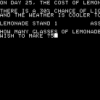- Dynamic/interactive environment
- Small Arena
- Graphics not too important at first
- Animation
Magi: Introduction, concept and recommended engine
For more information about the Aperi Project Contact me via personal message either on here or facebook
The name "Magi" makes me think of Christmas, "We Three Kings", and myrrh. I understand that most designers pick a name straight away and hold on to it like a lifeline, but I would really consider choosing a more exciting, evocative, or just plain interesting name.
As to your question "Which Engine for a first-person-perspective game?" I'd give my normal advice -- it doesn't matter. Unreal 4 is great. So is Cry Engine. So is Unity. If you have experience with one, keep using it. Make a prototype today, right now, without delay. Worry less about your tools and focus on making games with them.
And, since it needs said, you posted no game design information. Just vague ideas about puddles and leaning to and fro in wonder at this amazing idea.
The concept? I'll keep my mouth shut.
Looking forward to the downvotes!
Indie games are what indie movies were in the early 90s -- half-baked, poorly executed wastes of time that will quickly fall out of fashion. Now go make Minecraft with wizards and watch the dozen or so remakes of Reservior Dogs.
As to the gameplay, it's difficult to comment without a more fully-developed version (whether described or--better yet--prototyped) to look at, but the concept sounds interesting. It might be a good idea to look at Chaos Reborn (if you haven't already) for comparison and potential ideas--while the core gameplay is different (they have a traditional list of spells rather than your element-manipulation system), it's also an arena-based magic-focussed player-vs-player game.
As GoCatGo suggests, I very much recommend getting a prototype made and posted somewhere for feedback (if you haven't already done so); it needn't be complete: the first prototype might only implement a single, relatively simple element, with a second being introduced once the elemental control is working nicely.
As to the choice of engine: To start with, if I may ask, why are you considering moving away from Unity?
(I'm tempted to suggest the engine that I use: Panda3D. It lacks the pipeline and tools of the others, but is free (and there's no "pro version" that requires a paid licence or royalties) and open-source. It does use some third-party elements that might muddy that a little, I think, but at least some can be excluded (for example, it includes fmod, which isn't free, but one can opt to use openAL instead).)
Finally, a minor point: "Magi" is the plural of "magus"; "mages" is the plural of "mage".
MWAHAHAHAHAHAHA!!!
My Twitter Account: @EbornIan
As others said before me:
From your words I conclude you are using Unity at the moment, and you list pretty basic and modest requirements for the engine (any 3D Engine can do that, with good performance). Yet you want to drop Unity for Unreal or CryEngine. Why?
Is there a reason why you don't want to use Unity anymore? Is it the "greener grass on the other side" concept? Did you hear too much hype about Unreal and CryEngine?
Don't get me wrong, I am sure UE4 is a fine and powerful engine that might be just as easy to learn as Unity with the help of the community (don't know, didn't try it yet). On CryEngine I have to say I was less than amazed when I downloaded it a year ago, gave the sample project a spin (buggy as hell, at least back then), and had a peek into the editor. Most probably also a fine engine as soon as you get to grips with the editor, as sample projects of engines more often then not, are kinda halfbaked efforts.
Still I was not convinced enough to jump over.
As has been said, more important than finding the perfect engine is to start prototyping. In a perfect world (where you have unlimited money and time), you will build your prototype, tweak it until it is fun or throw it away and start over. And then, when your Prototype shows that you are on to a "goldmine", you throw it away and start over.... you take the design you perfected in the prototype and write new, production ready code for that. So its easy to switch engine between the prototype and the production version.
Now we all know how the real world works...
Even then... any half-competent 3D Engine will do what you want. The only reason to pick UE4 or CryEngine over Unity or any other are some highend features that you most probably are not even able to use because of technical or time constraints... and you certainly will not need to get things bootstrapped.
move away from Unity
Is there a specific reason to do so? I'm not implying Unity is 'God allmighty' but I'd be interested to see the reasoning behind this. Especially with how animations work now in Unity that is...
I would love some feedback and ideas on how to go about getting the best optimization and getting "Interactive, Fluent, engaging" Abilities and game play. I am unsure if other games have tried this but would like to try some if there is.
I think the key prominent and most interesting feature in your concept is the ability to manipulate spells mid-air and modify their properties. For example, being tossed an icicle and thawing it into harmless water sounds like an amazing prospect. I hope you manage to make it intuitive enough for the mouse input and real-time enough so that the player feels more like a mage (mouse gestures, might I suggest?)
Also, gratz on taking it one step at a time. That's the way to go and a good way to be realistic about the whole plan.
Best of luck.
Question 1: The Game Engine
The plan was to move away from Unity and possibly invest in Unreal Engine 4 or the Cry Engine 3, but honestly lost on which one to use. I am leaning more towards the Unreal engine at the moment but would like some feedback from GameDev first, preferable from people who have used either one before. Or if there is another engine you would recommend please do so.
That question does not belong in the Game Design forum. It's a technical question, and will get you a better answer if you ask it in the For Beginners forum. This forum is for game design questions.
-- Tom Sloper -- sloperama.com
Questions 1 & 2 are pretty closely related actually:
With this prototype, I recommend picking your engine based off of which language your programmers are most proficient in. This strikes me as a tech-driven project (and as Tom Sloper mentioned, may get better answers in For Beginners).
However, I don't think you shouldn't be choosing your engine this early in the development. You need to nail down some of your design choices before you select your engine, or you may find your project limited by your choice of engine.
So now for the design feedback, which is probably the most important question to answer at this stage of development. This game has already been designed for you! It's called Rock Paper Scissors...or in this case Rock Paper Scissors Lizard Spock.

You can use this structure to balance the elements so no one element dominates play so players have to continuously change up their strategy. What can make this more interesting is using your magic to affect the environment, such as throwing lightning at a puddle of water your enemy is standing in, or freezing the ground to make it slippery.
What you need to nail down is:
- What elements can the player control? (5, 7, or 9 elements should be good. 3 may be too few to keep things interesting, and any more than 9 is too many to keep track of in a fast-paced game)
- How do these elements interact? (do elements only tie with the same element? Do fire and water cause steam to fog up the arena?)
- How can these elements affect the environment? (can the ground be made slick? Can walls be created?)
@Adam: I get the impression that mages in this game are intended to control only one element, and have multiple abilities with that element, rather than controlling a suite of elements: note the mention of a "Silver Mage" controlling a chunk of elemental silver in various forms, and the description of play depicting each mage using a single element in multiple ways. It's still more or less rock-paper-scissors, but with a different (possibly procedurally-defined) set of interactions for each pair of elements facing each other.
MWAHAHAHAHAHAHA!!!
My Twitter Account: @EbornIan










